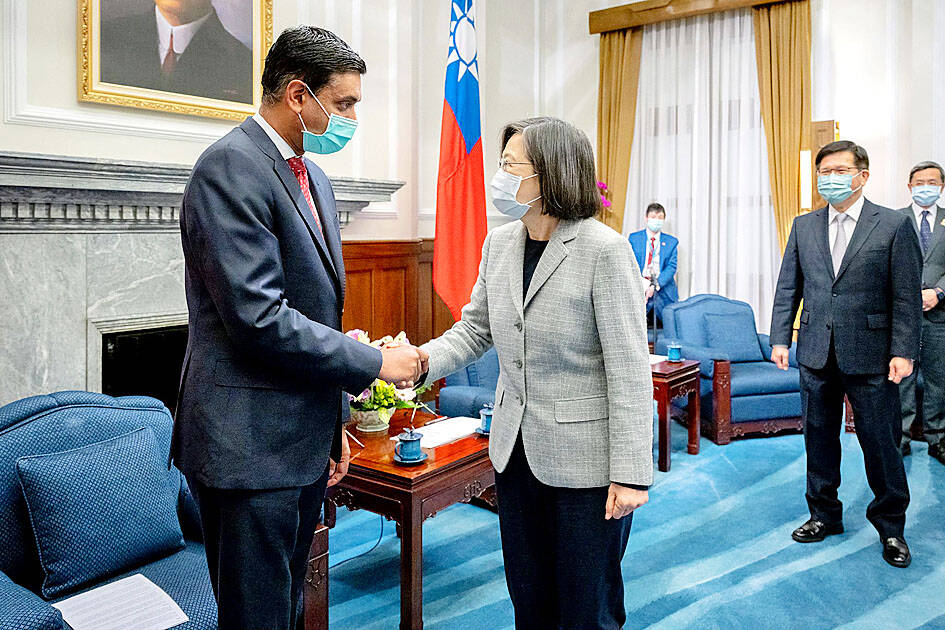Taiwan plans to boost military exchanges with the US to curb authoritarian expansionism, President Tsai Ing-wen (蔡英文) said yesterday after meeting with visiting US lawmakers.
The five-day US congressional visit comes after a top US defense official reportedly made a stopover in Taiwan.
“Taiwan and the United States continue to bolster military exchanges,” Tsai said after meeting with the delegation at the Presidential Office Building in Taipei. “Going forward, Taiwan will cooperate even more actively with the United States and other democratic partners to confront such global challenges as authoritarian expansionism and climate change.”

Photo: AFP / Taiwan Presidential Office
Tsai did not provide further details on what the future exchanges might entail.
It is time “to explore even more opportunities for cooperation” between the US and Taiwan, Tsai said.
“Together we can continue to safeguard the values of democracy and freedom,” she added.
Taiwan and the US should “leverage their respective strengths and together build more resilient technology industrial chains,” Tsai said, adding that the two countries have collaborated on semiconductors, 5G communications and renewable energy sources under bilateral science and technology initiatives.
US Representative Ro Khanna, a member of the newly created US House of Representatives committee on strategic competition with the Chinese Communist Party, said he was leading the bipartisan delegation’s visit to expand “the partnership on military and defense,” and to shore up ties with the nation’s world-leading semiconductor industry.
Established last month, the select committee is tasked with investigating issues related to US economic and security competition with China and making policy recommendations.
“We are here to affirm the shared values between the United States and Taiwan, a commitment to democracy, a commitment to freedom,” Khanna said yesterday.
He “particularly appreciated” a meeting on Monday with Taiwan Semiconductor Manufacturing Co (台積電) founder Morris Chang (張忠謀), Khanna said.
Also in the delegation, which arrived in Taiwan on Sunday for a five-day visit, are US representatives Jake Auchincloss — a member of the select committee — Jonathan Jackson and Tony Gonzales.
Beijing, which claims Taiwan as part of its territory and has vowed to seize it one day, opposes any official exchanges with the democracy and has reacted with anger to a flurry of trips to the island by US politicians in recent years.
Chinese Ministry of Foreign Affairs spokesman Wang Wenbin (汪文斌) yesterday accused Taiwanese leaders of “provocation,” saying that “any futile separatist conspiracy or scheme relying on foreign forces to undermine cross-strait relations will only backfire and never succeed.”
Taiwanese authorities “cannot change the inevitable broader trend toward Chinese unification,” Wang told a regular news conference.
Additional reporting by CNA

SECURITY: As China is ‘reshaping’ Hong Kong’s population, Taiwan must raise the eligibility threshold for applications from Hong Kongers, Chiu Chui-cheng said When Hong Kong and Macau citizens apply for residency in Taiwan, it would be under a new category that includes a “national security observation period,” Mainland Affairs Council (MAC) Minister Chiu Chui-cheng (邱垂正) said yesterday. President William Lai (賴清德) on March 13 announced 17 strategies to counter China’s aggression toward Taiwan, including incorporating national security considerations into the review process for residency applications from Hong Kong and Macau citizens. The situation in Hong Kong is constantly changing, Chiu said to media yesterday on the sidelines of the Taipei Technology Run hosted by the Taipei Neihu Technology Park Development Association. With

A US Marine Corps regiment equipped with Naval Strike Missiles (NSM) is set to participate in the upcoming Balikatan 25 exercise in the Luzon Strait, marking the system’s first-ever deployment in the Philippines. US and Philippine officials have separately confirmed that the Navy Marine Expeditionary Ship Interdiction System (NMESIS) — the mobile launch platform for the Naval Strike Missile — would take part in the joint exercise. The missiles are being deployed to “a strategic first island chain chokepoint” in the waters between Taiwan proper and the Philippines, US-based Naval News reported. “The Luzon Strait and Bashi Channel represent a critical access

‘FORM OF PROTEST’: The German Institute Taipei said it was ‘shocked’ to see Nazi symbolism used in connection with political aims as it condemned the incident Sung Chien-liang (宋建樑), who led efforts to recall Democratic Progressive Party (DPP) Legislator Lee Kun-cheng (李坤城), was released on bail of NT$80,000 yesterday amid an outcry over a Nazi armband he wore to questioning the night before. Sung arrived at the New Taipei City District Prosecutors’ Office for questioning in a recall petition forgery case on Tuesday night wearing a red armband bearing a swastika, carrying a copy of Adolf Hitler’s Mein Kampf and giving a Nazi salute. Sung left the building at 1:15am without the armband and apparently covering the book with a coat. This is a serious international scandal and Chinese

COUNTERINTELLIGENCE TRAINING: The ministry said 87.5 percent of the apprehended Chinese agents were reported by service members they tried to lure into becoming spies Taiwanese organized crime, illegal money lenders, temples and civic groups are complicit in Beijing’s infiltration of the armed forces, the Ministry of National Defense (MND) said in a report yesterday. Retired service members who had been turned to Beijing’s cause mainly relied on those channels to infiltrate the Taiwanese military, according to the report to be submitted to lawmakers ahead of tomorrow’s hearing on Chinese espionage in the military. Chinese intelligence typically used blackmail, Internet-based communications, bribery or debts to loan sharks to leverage active service personnel to do its bidding, it said. China’s main goals are to collect intelligence, and develop a